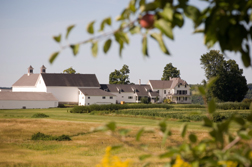Farm Scoop – October 2014
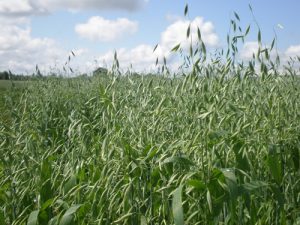 Webinar — Using Cover Crop Mixtures to Achieve Multiple Goals on the Farm
Webinar — Using Cover Crop Mixtures to Achieve Multiple Goals on the Farm
During this webinar, a team of researchers at Penn State University will discuss the use of cover crop “cocktails” or mixtures to achieve weed suppression, nitrogen scavenging, nitrogen provisioning, and attracting beneficial insects and pollinators. Results from a study of winter cover crops in a grain and forage research project at the Penn State Rock Springs Research Farm and from several Pennsylvania farms will be shown. They will also review issues of cover crop timing, termination, and general management to aid in farmer insight and adoption of cover crop mixes. The webinar takes place on Tuesday, October 14 at 2 p.m. Eastern. The presentation will last an hour, followed by 30 minutes for questions. Attendees will be able to type in questions for the speakers. The webinar is free and open to the public, and advance registration is required.
Farms for the Future Grant Program — Deadline October 27
State of Maine Department of Agriculture, Conservation and Forestry Public Notice for RFP#201408822
Maine Farms for the Future Program, Round 14: Phase 1- Business Plan Development with opportunity for Phase 2 Investment Support in 2016.
The State of Maine Department of Agriculture, Conservation and Forestry, Bureau of Agriculture, Food and Rural Resources is required to offer grants for business plan development (Phase 1) and investment support (Phase 2) as authorized in the Maine Farms for the Future Program (Title7, MRS Chapter 10-B). In accordance with State procurement practices, the Department is hereby announcing the publication of a Request for Proposals RFP#201408822 from eligible farm owners for the purchase of such services.
A copy of the RFP can be obtained by contacting the Department’s Assistant RFP Coordinator for this project; Kimbalie Lawrence via email, or regular mail: 28 State House Station, Augusta, Maine, 04333-0028 Attn: Kimbalie Lawrence.
The Department encourages all eligible and interested vendors to obtain a copy of the RFP and submit a competitive proposal. Proposals must be submitted to the State of Maine Division of Purchases, located at the Burton M. Cross Office Building, 111 Sewall Street, 4th Floor, 9 State House Station, Augusta, Maine, 04333-0009. Proposals must be submitted by 2:00 pm, local time, on Monday, October 27th, 2014, when they will be opened at the Division of Purchases’ aforementioned address. Proposals not received at the Division of Purchases’ aforementioned address by the aforementioned deadline will not be considered for contract award.
Farm Grants / Funding Sources
- Crowdfunding site Barnraiser introduces the people behind sustainable food and farming projects and offers members an opportunity to fund their success. The site is now accepting any project of $2,000 or more that moves the needle forward toward healthy, sustainable and soulful, and humane food and farming. Projects are created online and shared by the creators with their social circles and community. If a project meets or exceeds funding goals when the deadline arrives, then all of the backers that have pledged support are charged and the project receives funding. Click here for more info about Barnraiser.
- USDA National Organic Program has released a new fact sheet for farmers to learn about the Organic Certification Cost Share Programs. These programs reimburse individual organic operators up to 75% of their certification costs up to $750 per category of certification. Click here for cost share program information.
- Northeast SARE Partnership Grants are reserved for agricultural service providers—extension staff, nonprofits, consultants, state departments of agriculture, and others working in the agricultural community—who want to conduct on-farm demonstrations, research, marketing, and other projects with farmers as active cooperators. The Partnership guidelines have been expanded to incorporate proposals formerly submitted under the Sustainable Community Grant. The application deadline is November 4, 2014.
- Northeast SARE Farmer Grants are for commercial producers who have an innovative idea they want to test using a field trial, on-farm demonstration, marketing initiative, or other technique. A technical advisor—often an extension agent, crop consultant, or other service professional—must also be involved. Projects should seek results other farmers can use, and all projects must have the potential to add to our knowledge about effective sustainable practices. Application deadline is December 2, 2014.
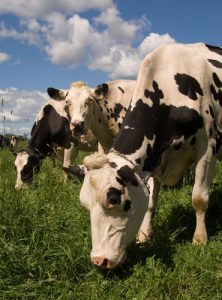 Two Cattle Loans are available through the Rural Rehabilitation Trust Fund at the Maine Department of Agriculture, Conservation and Forestry. The Maine Feeder Cattle Loan Program is to purchase feeder calves intended for slaughter or resale. The Maine Beef Cattle Breeding Stock Loan Program is for purchase of heifers to be used as breeding stock. The length of the loans is 12 months for feeder calves and 24 months for breeding stock. These loans are available year round. There is a maximum of $50,000. per loan. These are designed for cattle producers with existing land, buildings, equipment and knowledge of beef cattle. There are loan requirements. For further information, please contact Cindy Kilgore or 207.215.4968.
Two Cattle Loans are available through the Rural Rehabilitation Trust Fund at the Maine Department of Agriculture, Conservation and Forestry. The Maine Feeder Cattle Loan Program is to purchase feeder calves intended for slaughter or resale. The Maine Beef Cattle Breeding Stock Loan Program is for purchase of heifers to be used as breeding stock. The length of the loans is 12 months for feeder calves and 24 months for breeding stock. These loans are available year round. There is a maximum of $50,000. per loan. These are designed for cattle producers with existing land, buildings, equipment and knowledge of beef cattle. There are loan requirements. For further information, please contact Cindy Kilgore or 207.215.4968.
- Fair Food Consulting Corps cost share grant for business assistance funding to support the growth of a Maine-based good food enterprise.Applicants may propose to work with a consultant of their choice (who Consulting Corps leadership will need to approve.) They fund up to $10,000 of the cost of consulting services and project administration. Participating entrepreneurs are asked to share a portion of the cost of consulting services received. For more information about the Fair Food Consulting Corps program and to apply, please visit their website. Completed applications should be submitted to Alex Linkow, Fair Food Fund Program Director. Applications will be reviewed on a rolling basis as they are received.
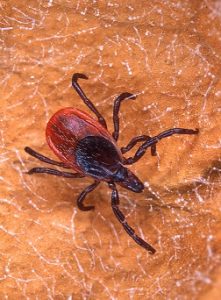
Why a New Animal/Plant Disease and Insect Control Lab for Maine?
On November’s ballot there will be an $8,000,000 bond referendum to support Maine agriculture, facilitate economic growth in natural resource based industries, and monitor human health threats related to ticks, mosquitoes, and bedbugs through the creation of an Animal and Plant Disease and Insect Control Laboratory administered by University of Maine Cooperative Extension.
Explore the ways a new Animal/Plant Disease and Insect Control Laboratory will benefit Maine by clicking on one of these topics:
USDA Disaster Program Information
The USDA Emergency Brochure, on the different programs available for farmers during an emergency or disaster, has been updated for 2014. The brochure is available here USDA Disaster Program Information (PDF) for download.
Update Hay and Straw Directory
If you have excess, or are in the position to sell hay or straw, consider using the Maine Hay and Straw Directory. It is free to use. More information is available online, or call Cooperative Extension 1.800.287.1426.
Recipe to Market
Do you have a food-related idea for an enterprise? If so, the success of your idea likely doesn’t happen on its own. Much has to be considered and planned for in developing a successful food item. The University of Maine has a newly revised publication (bulletin #3101) Recipe to Market: How to Start a Specialty Food Business in Maine.
View the entire University of Maine Cooperative Extension Publications Catalog online.
Food Preservation & Youth
The Put It Up! Food Preservation for Youth curriculum, from the National Center for Home Food Preservation, is a series of informal educational lessons that guide youth to explore and understand the science of safe food preservation.
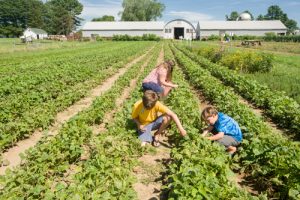 Farm Rental Rates
Farm Rental Rates
The University of Vermont Extension’s new How to Determine the Right Farm Rental Rate Guide was developed to support both farmers and landowners through the process of determining a fair cash rental rate for farmland, equipment and infrastructure in Vermont. The same methods might apply to other states in New England, the Northeast, or other parts of the U.S.
“Farmland and farm infrastructure rental rates can be tough to determine because there are many variables to consider,” says Ben Waterman author of the guide and New Farmer Coordinator at the UVM Center for Sustainable Agriculture. “However, the process can be simple. The guide explains common methods so farmers and landowners can forge lease arrangements with confidence.”
UVM Extension Agricultural Financial Management Specialist Mark Cannella adds, “Rental rate questions are by far the most common question I get from farmers contacting me as a business specialist at UVM Extension. This guide will help property owners and tenants better understand the factors influencing rental rates and make a determination on which rate-setting strategy is the best fit for their own situation.”
Divided into five sections, the 31-page guide is available for free download and offers approaches to:
- Assess market rental rates;
- Assess landowner’s costs of owning land;
- Value equipment and infrastructure in a lease;
- Factor the farm business’ net returns in the rental rate; and
- Assess the farmer’s contributions to the lease arrangement
For more information, go to the UVM Extension website. Download the How to Determine the Right Farm Rental Rate guide.
Poultry Webinars from eXtension.org
Processing poultry (Oct. 21, 2014, 7 p.m. Eastern)
Starting a small-scale commercial poultry operation (Nov. 6, 7 p.m. Eastern)
Giving Your Horse the Best Chance During a Disaster
This is a My Horse University archived webinar that discusses practical things that horse owners should know and can do, that will reduce the risk to horses during fires, floods and storms.
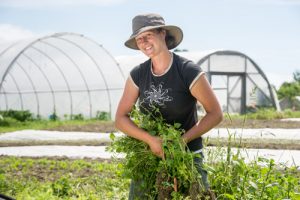 On-Farm Market Directory
On-Farm Market Directory
Building on the success of the National Farmers Market Directory, USDA has developed national directories for On-Farm Markets, CSA Enterprises, and Food Hubs designed specifically to communicate operating information, product selection, terms of payment, and most importantly, location (addresses and map coordinates) in a dynamic environment that allows you to enter your baseline information in minutes, then update it anytime you want. The directories are available free of charge to registering organizations and businesses. Register as many organizations or businesses as you manage, own, or operate. The directories will be available to the public no later than January 2015.
The main registration and update webpage includes brief description of each directory.
Contact USDA for more information.
2014 Farm Bill Informational Meetings
Dairy sessions will be held in October throughout the state. General sessions will be held in November. For the complete schedule of sessions go to the Maine Farm Service Agency Site.

